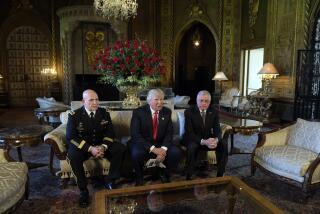Readers React: Why political gridlock isn’t always a bad thing
- Share via
To the editor: According to Jared Diamond, a “majority of decent Americans” are so distressed about political gridlock they may turn to authoritarianism to get things moving. Projection, anyone? (“America needs to study the enemy within,” Op-Ed, Dec. 26)
The gridlock that Diamond deplores results from features the founders built into our system to make change difficult to achieve without consensus. They feared the power of vociferous factions and sought to check it by dividing the federal government into co-equal branches.
The current wailing over gridlock typically comes from liberals who favor a large and growing government and who really can’t lose by compromising (if Democrats want $100 billion in new spending or taxes and Republicans don’t, splitting the difference still results in new spending or taxes).
For fans of limited government, there are worse things than gridlock. Who wants to play a game in which a “tie” is your loss, only smaller?
Michael Smith, Cynthiana, Ky.
..
To the editor: While it’s hard to disagree with Diamond’s premise that political extremism and congressional gridlock may be more of a threat to our democracy than external aggression, he carefully sidesteps specifics.
It is the tea party Republicans opposed to President Obama and abetted by a Republican majority on the Supreme Court that bear the primary responsibility for pushing us from a functioning democracy to something perilously close to a plutocracy.
To illustrate his point, Diamond blames the coup against Chile’s democratically elected Salvador Allende partly on Allende’s refusal to compromise, making no mention of the CIA’s role in bringing dictator Augusto Pinochet to power.
Diamond’s failure to deliver the full story undermines his premise, bringing us no closer to understanding how to save our democracy from self-destruction.
Jack Cooper, North Hollywood
..
To the editor: Although I found Diamond’s comparisons between the economically free-falling, politically gridlocked Chile of 1973 and the United States of today overwrought, I was reminded of Abraham Lincoln’s pre-Civil War prophecy:
“All the armies of Europe, Asia and Africa combined, with all the treasure of the Earth (our own excepted) in their military chest, with a Bonaparte for a commander, could not by force take a drink from the Ohio or make a track on the Blue Ridge in a trial of a thousand years.... If destruction be our lot, we must ourselves be its author and finisher.”
Chris Norby, Fullerton
Follow the Opinion section on Twitter @latimesopinion
More to Read
A cure for the common opinion
Get thought-provoking perspectives with our weekly newsletter.
You may occasionally receive promotional content from the Los Angeles Times.









